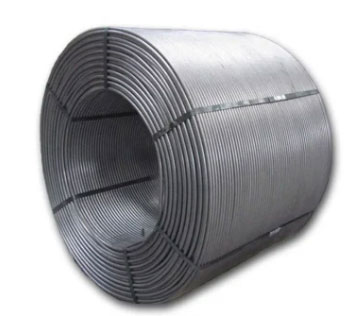
Cored wire is a critical component in the steelmaking process. It is used to add specific elements to molten steel to improve its quality and characteristics. In this article, we will explore the use of cored wire in steelmaking, including its benefits, types, and applications.
Cored wire is a type of alloy product that is used to add specific elements to molten steel during the steelmaking process. It consists of a metal sheath that is filled with a powdered alloy core. The cored wire is fed into the steel melt using wire injection technology, which ensures that the core is distributed evenly throughout the molten steel.

There are several benefits of using cored wire in steelmaking, including:
Improved Quality: Cored wire can be used to add specific elements to molten steel that improve its quality, such as increasing its fluidity, castability, and overall performance.
Consistency: Cored wire is a precise method of adding specific elements to molten steel, ensuring consistency in the final product.
Reduced Costs: Cored wire is a cost-effective method of adding specific elements to molten steel compared to traditional methods such as adding alloys in bulk.
Increased Efficiency: Cored wire injection technology allows for the precise and efficient delivery of specific elements to molten steel, reducing waste and improving efficiency.
There are several types of cored wire available for steelmaking, each with its specific applications and benefits. Some of the most common types of cored wire include:
Calcium Cored Wire: Calcium cored wire is used to add calcium to molten steel, which helps to improve the steel's fluidity, castability, and overall quality.
Carbon Cored Wire: Carbon cored wire is used to add carbon to molten steel, which helps to increase the steel's hardness and strength.
Aluminum Cored Wire: Aluminum cored wire is used to add aluminum to molten steel, which helps to improve the steel's quality and makes it more resistant to corrosion.
Magnesium Cored Wire: Magnesium cored wire is used to add magnesium to molten steel, which helps to improve the steel's quality and makes it more resistant to high temperatures.
Cored wire has several applications in the steelmaking process, including:
Ladle Treatment: Cored wire can be used in ladle treatment to improve the quality of the steel before it is cast into a final product.
Continuous Casting: Cored wire can be used in continuous casting to improve the quality of the steel and reduce defects in the final product.
Secondary Metallurgy: Cored wire can be used in secondary metallurgy processes such as vacuum degassing to remove impurities from the steel.
Special Steel Applications: Cored wire can be used in the production of special steel alloys, such as high-strength low-alloy (HSLA) steel.
Cored wire is an essential component in the steelmaking process, providing a precise and cost-effective method of adding specific elements to molten steel to improve its quality and performance. Calcium, carbon, aluminum, and magnesium cored wire are some of the most common types used in steelmaking, with applications ranging from ladle treatment to continuous casting and secondary metallurgy. By using cored wire, steel manufacturers can produce high-quality steel products that meet their customers' specific requirements.

Write a Message